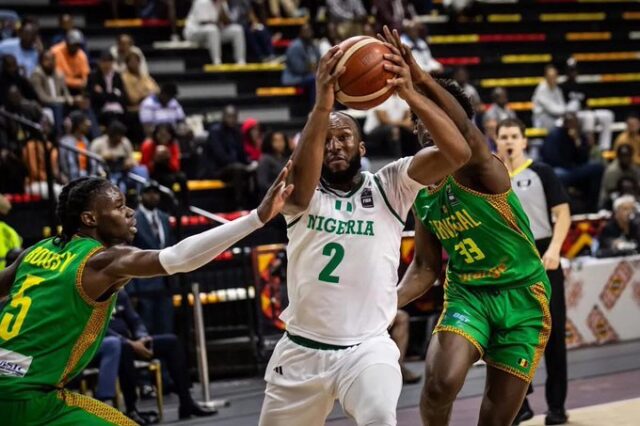The story of the 2025 AfroBasket quarterfinals Nigeria vs Senegal was written in Luanda with a ruthless second quarter and a bruising battle on the boards, as Senegal toppled Nigeria 91-75 to march into yet another semifinal. On a night that started with promise for D’Tigers, the Lions found their rhythm, seized control early in the second period, and never looked back.
The Pavilhao Multiusos de Luanda felt charged from the opening tip, and the first quarter delivered the spectacle everyone expected. After seven lead changes, Nigeria edged it 24-23, a signal that this West African rivalry still had bite. The tension lasted exactly one possession into the second quarter, when Jean Jacques Boissy splashed a three, then Amar Sylla buried another, flipping the scoreboard and the momentum in a heartbeat.
From there, Senegal went on a 13-5 push that forced a Nigerian timeout, but the damage was already visible. The Lions won the second quarter 30-18 and took an 11-point cushion to halftime, a platform they built on with power and poise. By the third, the lead swelled to as many as 24, a statement stretch that turned a tight game into a chase Nigeria could not finish.
Even as D’Tigers fought to take the fourth 20-15, Senegal’s control never wavered. The scoreboard read 91-75 at the end, a result that reflected both execution and effort. For Nigeria, undefeated in the group stage, the abrupt exit stung, especially given how close the contest felt only minutes into the second quarter.
The performance that changed the game
Brancou Badio was the pulse of Senegal’s offense, and he was relentless. The Valencia guard poured in 32 points, attacking the rim, rising from the wings, and punishing every defensive lapse. Each make amplified Senegal’s swagger, and each possession seemed to tilt further in the Lions’ favor.
Off the bench, Boissy turned the game’s tempo with timely shot making. He finished with 21 points, including 5-of-10 from deep, the kind of microwave performance that burns through a scouting report in seconds. Moustapha Diop added balance with a double-double of 14 points and 10 rebounds, a quiet pillar at both ends that kept the floor steady.
For Nigeria, there were sparks, but not enough sustained fire. Ike Nwamu scored 15, Stan Okoye added 14 with seven boards, and Caleb Agada chipped in 12. The issue was less about individual scoring, more about flow and physicality, the kinds of rhythms that Senegal dictated once they grabbed the lead for good.
The battle of the glass and the lesson in size
Senegal brought length and used it with intent. They are the tallest team at AfroBasket 2025, and the numbers told the story, a 53-35 rebounding edge that squeezed Nigeria’s second chances and supercharged transition looks. Every contested board felt like a small win for the Lions, and by the third quarter, those small wins had snowballed into separation.
It was not just the volume of rebounds, it was where they happened. Defensive rebounds ended Nigerian hopes of extended possessions, while offensive rebounds extended Senegal’s patience and composure. In a knockout game, those extra touches are oxygen, and Senegal breathed easier all night.
What turned a thriller into a procession
Coaches will circle the start of the second quarter as the fulcrum. Right after the first break, Boissy’s three, then Sylla’s, cracked open the door, and Senegal simply walked through it. From that moment, Nigeria never led again, a reminder that in tournament basketball, a one-minute lapse can spiral quickly.
Senegal’s team talk after the opening period clearly hit the right notes. They targeted Nigeria’s permissive defense early in the second, found clean looks, and buried them. With the perimeter threatened, Nigeria’s shape bent inward, and Badio picked the seams with relentless efficiency.
The human side of victory and defeat
There is always a heartbeat behind the box score. Ike Nwamu spoke with candor about the flat start and the cost of chasing a game that slipped away. His words carried the honesty of a locker room that believed, then saw a superior night from a superior opponent.
It hurts. We had high hopes, we had a really good group, fun group, we all love each other, but it’s part of the game, one team has to win, another has to lose. It was not our day today. They came out with more energy. We were kind of flat to start. They are a really good team, they got lots of high-level players. It was their night today.
Nigeria head coach Mohammed Abdulrahman echoed the theme of accountability and progress. In defeat, he looked forward, pointing to foundations laid and identity forged, the intangible wins that can outlast a difficult night.
In a night we were supposed to bring our A-game we fell short. I am not taking any credit away from Senegal, they deserve the win. I am proud of how we played. We have an identity now and we are just moving from it.
How both teams arrived at this crossroads
Senegal’s path had already included turbulence and resilience. They opened group play with an 88-53 win over Uganda, stumbled 91-77 against Egypt, then steadied with an 80-70 victory over Mali to finish second in their group. In the playoff to reach the quarters, they beat South Sudan 78-65, a game where Brancou Badio erupted for 31 points, with Ibrahim Faye adding 12 and nine boards, and Ibou Badji patrolling the paint with nine points and 13 rebounds.
Nigeria, by contrast, looked like a locomotive in the groups. They beat Madagascar to set the tone, flattened defending champions Tunisia 87-66 with Josh Okogie lighting it up, and then outgunned Cameroon 99-90 to secure a perfect 3-0 record. That momentum carried into the first quarter against Senegal, before the game shifted under their feet.
Quarter by quarter, the anatomy of 91 to 75
The first act belonged to the rivalry. Nigeria edged the opening period 24-23, matching energy with shot making and forcing Senegal into tough reads. It was the kind of start that promised a wire-to-wire finish, at least until the second quarter reset the tone.
Senegal took command 30-18 in the second, a swing that reflected their shot profile and discipline. In the third, they extended the margin 23-13, a stretch marked by multiple runs and a suffocating grip on pace. Nigeria won the last quarter 20-15, but the die was already cast, a late push that proved too little against an opponent in full control.
Key stats at a glance
- Scoreline and quarters, Senegal 91-75, quarters 23-24, 30-18, 23-13, 15-20,
- Glass control, Senegal outrebounded Nigeria 53-35,
- Top performers, Badio 32 points, Boissy 21 off the bench with 5 threes, Diop 14 and 10, Nwamu 15, Okoye 14 with seven rebounds, Agada 12.
What comes next for Senegal
This win returns Senegal to the AfroBasket semifinals for the fifth time since 2013, a model of consistency that speaks to culture and depth. The immediate task is familiar and demanding, a semifinal against Mali, a team the Lions already beat 80-70 in Group D.
The tape will show a team that leans into its size, rebounds with conviction, and rides the hot hand without hesitation. If Badio continues to score with this freedom, and if Boissy keeps punishing rotations from the bench, Senegal’s ceiling will remain high heading into the last four.
What comes next for Nigeria
For D’Tigers, the journey pauses, not ends. They became the second unbeaten team to reach the quarters, alongside Côte d’Ivoire, and they will feel that this tournament held more for them. The lesson is sharp, the margins are thin, and the next step is to turn the identity their coach referenced into consistent execution across forty minutes.
Nigeria still carries the memory of continental glory, and the ambition to add to it. In Luanda, the decisive moments belonged to Senegal, but the building blocks, from a perfect group run to competitive guard play, remain. The work now is to translate those positives into knockout toughness the next time the lights are brightest.
The bigger picture of a classic rivalry
There is history in every Nigeria and Senegal meeting, and this one added another chapter. For Senegal, there was a measure of satisfaction, a result that answered the memory of losing to D’Tigers in the 2015 final. For Nigeria, there will be the sting of an opportunity missed, and the resolve to meet this standard again.
Quarterfinal basketball is often about who adapts faster. In Luanda, Senegal adjusted quickly, trusted their size, and trusted their stars. Nigeria landed the first punches, but Senegal threw the last, and most telling, combinations, a reminder that in tournaments, it is not how you start that matters, it is how you finish.
Final word
Strip away the numbers and you still find the essence of this game. Senegal stayed composed, imposed their will on the glass, and let a star turn from Brancou Badio set the tone. Nigeria showed heart, but in this arena, heart must be matched by control, and control was painted in green, yellow, and red on a memorable night in Luanda.





